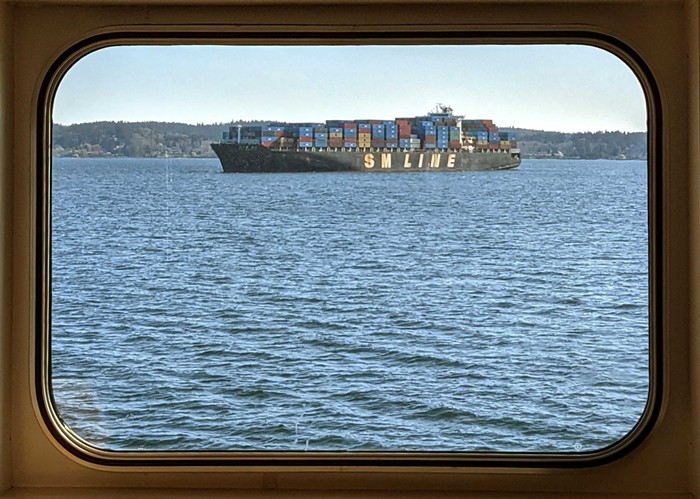
The thinking in mainstream media has been to give both sides a say in the matter of a class conflict (managers versus workers). But if one looks at the articles by Seattle Times' aviation reporter Dominic Gates, we find the lion's share of say in class conflicts at Boeing has been repeatedly handed to management. You will not find in any one of his pieces anything close to an evaluation or examination of the press releases sent to Seattle from Chicago, the current headquarters of the airplane manufacturer and ground zero of the 737 Max mess. In his 2009 article "4,500 at Boeing to lose their jobs," he even made management sound coherent and union leaders sound muddled. In his April 2017 article, "Boeing plans hundreds of layoff notices for engineers this week," he only provided the voice of management, which, of course, blamed the job cuts that hit the engineering department hard, on "competition".
From the Gates piece:
...[I]n December, Boeing Vice Chairman Ray Conner and the new chief executive of Boeing Commercial Airplanes, Kevin McAllister, issued a joint message to employees warning that “fewer sales opportunities and tough competition” would drive further cuts in 2017.That year (2017), the stock market value of Boeing stood almost $70 above its valuation a year before ($115). The next year, it would be rise to a stunning $330. Gates did not bother to question how a company that's so obviously performing well on the market is doing so poorly in real terms. Why cut jobs when the market is so optimistic? Lastly, he mentioned, without a second thought, the corporate metaphysics of competition as if it were a force of nature, a fact of life like the production of bio-products in the photocells of plants. But why is the idea of competition metaphysical rather than real? Here is the answer.
Boeing’s departing CEO leaves company with $62 million amid 737 Max supplier layoffs https://t.co/6rue0MGzmE #Aircraft #Boeing pic.twitter.com/wDv0jV51hC
— horror__bites (@BitesHorror) February 13, 2020
As the greatest economist of the 20th century, Joan Robinson, explained in her short book Economic Philosophy, "metaphysical statements... express a point of view and formulate feelings which are a guide to conduct." The result? We, the public, often find ourselves in "a fog of metaphysics masquerading as analysis." Indeed, the Seattle Times' reports on Boeing layoffs over the past eight years can be described by the image of a fog machine.
Since the 1970s, corporations have resorted to this explanation (competition is stiff at present) to justify job cuts when things are going well and when things are going bad. But the substance of the competition reasoning has been examined and critiqued by a number of economists (heterodox) that Dominic Gates has most likely never heard of and was probably taught or instructed to ignore. What is well-understood by this group of economists excluded from mainstream reporting is that the concept of competition has little to no empirical value. It is not a fact of life but instead, a weapon used by management in its endless conflicts with labor. Indeed, neoliberal management places competition not only at the heart of decision-making processes that led to layoffs, but it also requires its workers to be competitive subjects. If you see yourself as a competitor, how can you blame your boss for cutting your job? He, too, is being competitive.
In her 2015 book Undoing the Demos, the political theorist Wendy Brown described neoliberal rationality (which is directed by the metaphysics of competition) in this way:
First, we are human capital not just for ourselves, but also for the firm, state, or postnational constellation of which we are members. Thus, even as we are tasked with being responsible for ourselves in a competitive world of other human capitals, insofar as we are human capital for firms or states concerned with their own competitive positioning, we have no guarantee of security, protection, or even survival.Brown registered three metaphysical concepts that dominate current economics: "competitive positioning, credit rating, and growth."
But there is more to the metaphysics of competition. The most difficult thing for many Americans to understand is that the main source of wealth for those at the top is not profits from doing regular business (buying cheap, selling dear, that sort of thing), but raw dispossession in purely class terms. This has nothing to do with, say, something like a honey-hungry bear exploiting bees or a fungus turning an ant into a zombie. You will find little that's immediately natural in class-structured forms of dispossession; it is instead primarily cultural. What happens in capitalism, what makes its whole mode of being possible, is that there be an agreement among individuals that wealth as value exists. Once this agreement is settled, the appropriation of wealth (as value and materials) by one group from another can occur.
Because value is metaphysical (a belief, or cultural) to begin with, so is the idea of market competitiveness. But the problem with mainstream media, with reporters like Gates, is they never subject these neoliberal notions to even the slightest criticism or examination or questioning. They present them to the public exactly as management presented it to them. (I also understand from an aviation journalist that this kind of thing—parroting press releases from the top—is more prevalent in this particular field because reporters fear falling out of favor with management.) Nevertheless, Gates helped legitimize the myth of competition, and as a consequence, contributed to the worst crisis that Boeing has ever faced, a crisis that has claimed over 300 lives and made the future of $100 billion worth of planes unknown.
I will leave you with yet another example of Gates's "reporting." In his May 24, 2016 article "Boeing plans hundreds of layoffs in local IT unit," he told his readers what the Boeing corporate spokeswoman Lauren McFarland told him: The layoffs were due to an "effort to increase [Boeing's] competitiveness.”



















